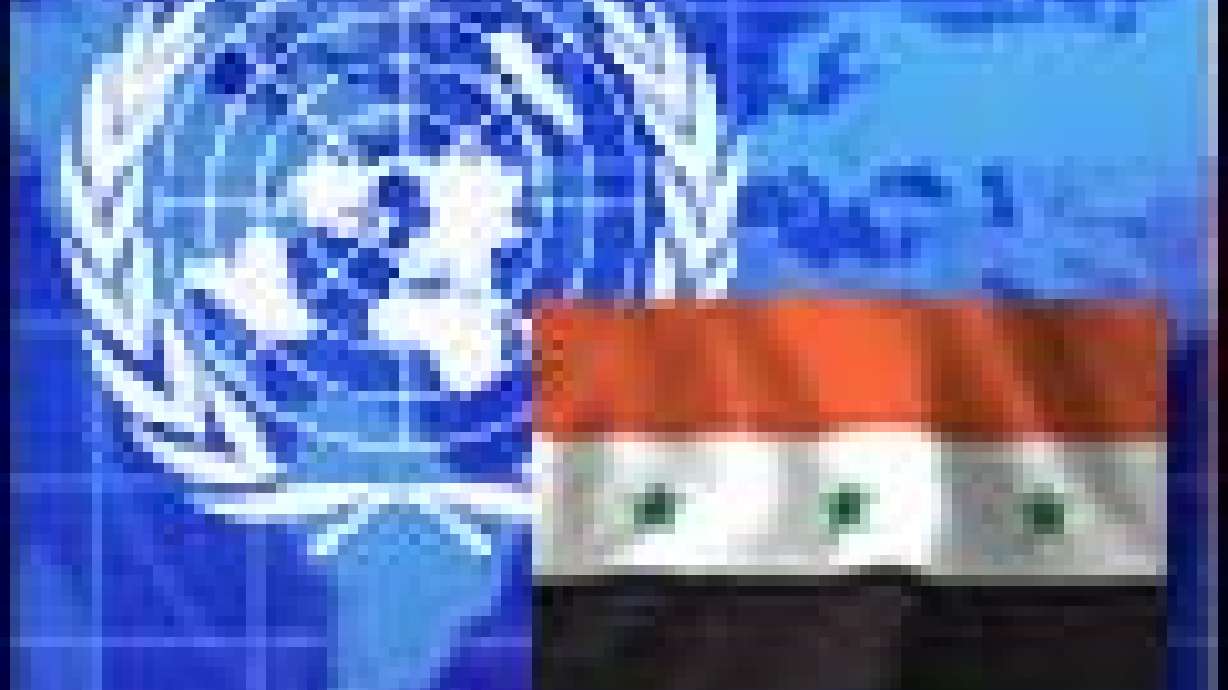Estimated read time: 4-5 minutes
This archived news story is available only for your personal, non-commercial use. Information in the story may be outdated or superseded by additional information. Reading or replaying the story in its archived form does not constitute a republication of the story.
UNITED NATIONS (AP) -- Stepping up the pressure for a vote next week, the United States presented a revised resolution to the U.N. Security Council to immediately lift sanctions against Iraq, but Russia and China signaled Friday they still want major changes.
Russian Foreign Minister Yuri Fedotov told the Interfax news agency after meeting China's Deputy Foreign Minister Yang Wenchang that both countries "believe that provisions in this draft resolution require serious amendments."
Secretary of State Colin Powell fared better on a trip to Germany, where Chancellor Gerhard Schroeder said it "makes no sense" to keep punitive sanctions on the backs of the Iraqi people.
Powell said in Berlin that getting a consensus on a resolution should be possible "within the next several days or a week."
Despite his concerns, Russia's Fedotov also remained hopeful that a compromise can be found, saying only a compromise "may restore unity in the U.N. Security Council," Interfax reported.
On Thursday, Powell briefly raised the possibility of suspending the sanctions as Russia and France have urged, but later backtracked and said the United States wants them lifted immediately.
The new U.S. draft makes more than 25 changes to address council members' concerns about postwar Iraq, said Richard Grenell, spokesman for U.S. Ambassador John Negroponte.
"We think we've moved significantly, Grenell said.
But the revised draft does not significantly change two key concerns of many council members -- the limited role of the United Nations in postwar Iraq and the powerful role of the United States and Britain as occupying powers.
The United States handed the nine-page draft to council experts on Thursday. The experts agreed to meet again on Friday.
Russia's Fedotov appeared to be referring to the revised draft in his comments Friday, though he didn't make any direct reference to the changes made.
"There are some things that are positive," Syria's deputy U.N. Ambassador Fayssal Mekdad said Thursday, "but the most sensitive issues are still here and we have not gone through them."
The United States faces resistance from four key countries which opposed the U.S.-led invasion of Iraq -- France, Russia, China and Germany. All favor a stronger U.N. role in postwar Iraq.
Reflecting the view of many nations, Pakistan's Foreign Minister Kursheed Kasuri, whose country currently holds the Security Council presidency, said greater U.N. involvement would make conditions more transparent.
Pakistan and other countries are ready to help coalition forces, but only if the United Nations plays a bigger role in forming a new government, he said in Washington.
Russia and France have called for sanctions to be suspended because under Security Council resolutions, U.N. weapons inspectors must certify that Iraq's weapons of mass destruction have been eliminated. Since the end of the war, the United States has barred U.N. inspectors from returning, deploying its own teams instead.
The Bush administration would like to lift sanctions immediately, but agreeing to a suspension might be the price it has to pay to get the resolution adopted quickly.
The revised resolution beefs up language used to describe what a new U.N. coordinator for Iraq will do, using words such as promote, encourage, and coordinate instead of support. But it does not increase the U.N.'s role in forming a new Iraqi government.
According to the new text, the United States and Britain would still be authorized to run the country for a year, with automatic extensions, and to control a development fund where money from oil sales would be deposited.
The resolution would lift the embargoes imposed after Saddam Hussein's 1990 invasion of Kuwait and phase out over four months the U.N. oil-for-food humanitarian program, which was designed to help ordinary Iraqis cope with sanctions.
Council approval would end U.N. control over the country's vast oil wealth and allow the United States and its allies to use the money to pay for the country's reconstruction.
Several council members had expressed concern about a provision in the original draft banning lawsuits involving the country's oil and natural gas. U.S. officials said that was necessary to hold off creditors owed US$400 billion by Iraq from claiming oil or tankers as payment.
The revised draft makes clear that the United States and its allies are not making any decisions about Iraq's debt.
(Copyright 2003 by The Associated Press. All Rights Reserved.)








